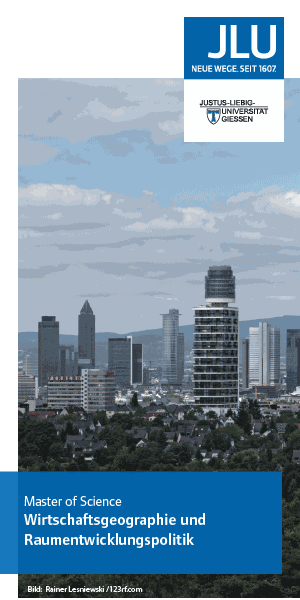Economic Geography and Spatial Development Policy (M.Sc.)
Taught in German
Overview
- Overview
-
Overview
The Master's programme economic geography, mobility and spatial development policy combines the field of economic geography (especially knowledge-based regional development and innovation research) with questions on new forms of mobility and interaction and consistently places this in the context of the policy fields regarding regional development. This ensures the teaching of job-related skills.
The programme is aimed at bachelor's graduates of economic geography who wish to deepen their theoretical knowledge on the topic of regional economic development and prepare themselves for the related professional fields. However, the course is also a useful specialisation for graduates of spatial planning who wish to expand their basic knowledge of the causes of spatial development and thus improve their ability to connect with other spatial policy fields outside of spatial planning (e.g. economic development, transport policy). Finally, the programme is aimed at bachelor's graduates of mobility or transport science disciplines who wish to expand their technical knowledge of socio-economic issues relating to new forms of mobility and social trends that affect spatial development.
During your studies you will acquire theoretical knowledge in the subject areas:- Regional disparities,
- Innovation research,
- Mobility research,
- Policy field research and
- Planning theory.
You will combine two of the three pillars - economic geography, mobility, spatial development policy - to form your personal study focus:
- Economy and Mobility or
- Economy and Spatial Development Policy or
- Mobility and Spatial Development Policy.
Depending on your study focus, the basic courses and a total of three study projects will deal with the current issues of economic geography, mobility topics and policy fields such as spatial planning, regional economic development, transport policy and innovation policy. This always takes into account practical challenges for which integrative solutions are developed. You will acquire methodological skills in the field of modern research methods and instruments (e.g. in-depth qualitative and quantitative methods, mixed methods, evaluation methods). In addition, you will learn methods that prepare you for non-university employment (e.g. moderation techniques, project management, development of new business models or new approaches to regional management). Evaluation methods build a bridge between research and practice.
The course of study is consistently internationally oriented (including semesters abroad) and systematically integrates institutions and lecturers from practice into teaching.
Further information can be found on the website of the department of geography
- Duration of studies 4 Semester 120 Credit Points (CP)
-
Duration of Studies
4 Semesters - 120 Credit Points (CP)
Composition of the Study Programme
- Duration of studies 4 Semester 120 Credit Points (CP)
-
Duration of Studies
4 Semesters - 120 Credit Points (CP)
- Composition of the Study Programme
-
Composition of the Study Programme
The Master's programme consists of a total of 18 modules, 15 of which are devoted to economic geography and spatial development policy. The definition, crediting and allocation of credit points (CP) is based on the ECTS system.
Modules
1. Semester CP 2. Semester CP Introduction-Module Economic Geography 6 Project 1: Economic Geography 6 Introduction-Module Spatial Development Policy 6 Project 2: Spatial Development Policy/Planning 6 Methods of Innovation- and Evaluation-Research and Regional-Management 3 Project 3: Interdisciplinary Project Geomarketing 6 Supplement Module Methods of Geography 6 General Skills: Theory and Methodology of Science 3 General Skills: Positioning in the Job Market and Moderation Skills 3 Reference Module 6 Reference Module 6 3. Semester CP 4. Semester CP General Skills: Stay Abroad Preparatory Course 3 Thesis 30 Independent Studies 9 Master Dissertation: Preparatory Seminar 3 General Skills: elective module 3 Internship 9 Reference Module 6 At least 12 CP must be acquired abroad.
In addition, a total of 18 CP in subsidiary subjects must be acquired in the course of the semesters (reference module). Weitere Information on the reference module can be found here Anlage 4 der Speziellen Ordnung (in German)-
Further Information
A description of the core- and specialisation modules can be found in the special regulations with module descriptions and module plans (in German)
More on this... ("Spezielle Ordnung")
Courses offered in the course catalogue
- Electronical course catalogue (in German)
-
Application
- Application: Entrance requirements
-
Commencement of studies
Winter semester, admission for the summer semester is possible after consultation with the chairperson of the Examination Board.
Entrance requirements
A Bachelor’s degree in Geography from a German university is considered to meet the admission requirements.
The Examination Board can recognise further (also foreign) courses of study as equivalent after examination on a case-by-case basis, e.g. with a focus on spatial planning, political science and economics, and, if necessary, bind admission to the Master's programme to conditions.
- Application not limited
-
Application for admission and registration
- The intake capacity of this degree programme is not limited internally by the university.
- Applications must be received by the JLU Student Secretariat by 15th January for the summer semester and 15th July for the winter semester. More on this...
- Special regulations apply to foreign applicants or those who gained their university-entrance qualifications abroad. Read more...
Career Options
- Career options
-
Career options
The main sources of employment are, on the one hand, the various levels of the civil service and, on the other hand, a broad range of different private business companies (see overview). In addition, numerous geographers work independently in one of the areas listed below.
Typical professional fields and areas of work in the civil service
Geographers work in the private sector or as freelancers in the following fields Land use planning Atlas / educational publishing District planning Vocational training Federal state planning Consulting Regional planning Waste management business Urban planning Retail trade / location planning Traffic planning Large companies (all sectors) Logistics Specialist publishing Real estate management
Nature conservationTourism Environmental research / environmental protection Remote sensing Environmental impact assessment Independent planning offices Spatial planning Environmental impact assessment Business promotion Chambers of industry and commerce / trade and professional associations Development research Dictionary / encyclopaedia publishing Location research Market research Development planning Marketing / logistics Tourism Oil business Databanks, etc. PR work Libraries and archives Planning and consulting enterprises Adult education Press Supply and waste management Databanks Landscape planning PR Work Detailed information about professional fields as well as graduate career opportunities can be obtained, for example, from the German Association for Applied Geography (DVAG).
Doctoral Studies at JLU
Doctorate possible with a Master's degree
International
- International: incomings
-
Stays abroad in Giessen for international students (outgoings)
Contact persons in the faculty 07
Information and advice
- International Office
Counseling and Information on Studying Abroad and on Training Periods (for JLU Students)
Goethestr. 58, room 22
35390 Giessen
Contact details and office hours
Stays abroad in Giessen for international students (incomings)
Contact persons in the faculty 07
Information and advice
- International Office
General Counseling of International Students
Goethestr. 58, room 38
35390 GiessenContact details and office hours
Further Information
- Further Information: Documents
-
PDF documents for the courses of study
- Study guide (in German)
Examination- and study regulations
- Special regulations (in German)
(with module descriptions and module plans)
(Please note that only the German version of the modules is offical and legally binding. The english Version is for informative purposes only.) - General study regulations for modular and multi-stage study programmes
Courses offered in the course catalogue
- Electronical course catalogue (in German)
- Study guide (in German)
- Master's Degree Programmes of Faculty 07
- International pages
-
Please have a look at our International Pages for more information in English.
- Any Questions
-

Any Questions?
Information- and advisory services of JLU can be found under the category “contact” on this page!
Contact
-
Subject Advisor
- Subject advisor
-
Prof. Dr. Stefan Hennemann
Department of geography
Schlossgasse 7, 1. OG
35390 GiessenTel.: 0641 - 99 36222
-
Links
-
Central Study Advisor
- Beate Pitzler
- Central Student Services
-
- Students office →
(for formal matters like matriculation) - Central student advisory office
(advice for students & prospective students) - Hotline Call Justus
(first contact for all matters pertaining to studies) - International office →
(for international students)
- Students office →

